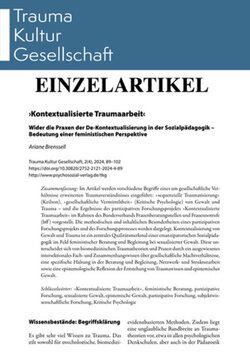14 Seiten, PDF-E-Book
Erschienen: November 2024
Bestell-Nr.: 36554
https://doi.org/10.30820/2752-2121-2024-4-89
abonnieren
Ariane Brenssell
›Kontextualisierte Traumaarbeit‹ (PDF)
Wider die Praxen der De-Kontextualisierung in der Sozialpädagogik - Bedeutung einer feministischen Perspektive
Sofortdownload
Dies ist ein E-Book. Unsere E-Books sind mit einem personalisierten Wasserzeichen versehen,
jedoch frei von weiteren technischen Schutzmaßnahmen (»DRM«).
Erfahren Sie hier mehr zu den Datei-Formaten.
Im Artikel werden verschiedene Begriffe eines um gesellschaftliche Verhältnisse erweiterten Traumaverständnisses eingeführt: ›sequenzielle Traumatisierung‹ (Keilson), ›gesellschaftliche Vermitteltheit‹ (Kritische Psychologie) von Gewalt und Trauma – und die Ergebnisse des partizipativen Forschungsprojekts ›Kontextualisierte Traumaarbeit‹ im Rahmen des Bundesverbands Frauenberatungsstellen und Frauennotrufe (bff) vorgestellt. Die methodischen und inhaltlichen Besonderheiten eines partizipativen Forschungsprojekts und des Forschungsprozesses werden dargelegt. Kontextualisierung von Gewalt und Trauma ist ein zentrales Qualitätsmerkmal einer emanzipatorischen Sozialpädagogik im Feld feministischer Beratung und Begleitung bei sexualisierter Gewalt. Diese unterscheidet sich von biomedizinischen Traumatheorien und Praxen durch ein ausgewiesenes intersektionales Fachund Zusammenhangswissen über gesellschaftliche Machtverhältnisse, eine spezifische Haltung in der Beratung und Begleitung, Netzwerkund Strukturarbeit sowie eine epistemologische Reflexion der Entstehung von Traumawissen und epistemischer Gewalt.
Abstract:
The article introduces various concepts of an understanding of trauma extended to include social conditions: ›sequential traumatization‹ (Keilson), ›social mediation‹ (critical psychology) of violence and trauma – and the results of the participatory research project ›Contextualised trauma work‹ within the framework of the Federal Association of Women’s Counselling Centres and Women’s Emergency Calls are presented. The methodological and content-related characteristics of a participatory research project and the research process are explained. Contextualisation of violence and trauma is a central quality feature of emancipatory social pedagogy in the field of feminist counselling and support in cases of sexualised violence. This differs from biomedical trauma theories and practices through a proven intersectional specialist and contextual knowledge of social power relations, a specific attitude in counselling and support, networking, and structural work as well as an epistemological reflection on the emergence of trauma knowledge and epistemic violence.
Abstract:
The article introduces various concepts of an understanding of trauma extended to include social conditions: ›sequential traumatization‹ (Keilson), ›social mediation‹ (critical psychology) of violence and trauma – and the results of the participatory research project ›Contextualised trauma work‹ within the framework of the Federal Association of Women’s Counselling Centres and Women’s Emergency Calls are presented. The methodological and content-related characteristics of a participatory research project and the research process are explained. Contextualisation of violence and trauma is a central quality feature of emancipatory social pedagogy in the field of feminist counselling and support in cases of sexualised violence. This differs from biomedical trauma theories and practices through a proven intersectional specialist and contextual knowledge of social power relations, a specific attitude in counselling and support, networking, and structural work as well as an epistemological reflection on the emergence of trauma knowledge and epistemic violence.
Annette Streeck-Fischer & David Zimmermann S. 5–8Editorial (PDF)
Trauma und PädagogikBessel A. van der KolkS. 9–20Zum Ausmaß der Folgen von Traumatisierung in der Entwicklung (PDF)
David Zimmermann & Lars Dabbert S. 21–33Traumapädagogik: Aktuelle Herausforderungen in verschiedenen Praxisfeldern (PDF)
Marc Schmid, Birgit Lang & Martin Schröder S. 35–51Traumapädagogische Konzepte im Kinderschutz und der öffentlichen Jugendhilfe (PDF)
Rebecca Friedmann & Ole Falck S. 53–72»Ich lasse mir nicht in den Kopf blicken …« (PDF)
Psychodynamisch Interaktionelle Pädagogik (PIP) mit aggressiven jungen Menschen, die sich nicht auf Therapie einlassen (können)Anne LindnerS. 73–87Perspektiven (PDF)
Schulentwicklung in unsicheren ZeitenAriane BrenssellS. 89–102›Kontextualisierte Traumaarbeit‹ (PDF)
Wider die Praxen der De-Kontextualisierung in der Sozialpädagogik - Bedeutung einer feministischen Perspektive
Trauma und PädagogikBessel A. van der KolkS. 9–20Zum Ausmaß der Folgen von Traumatisierung in der Entwicklung (PDF)
David Zimmermann & Lars Dabbert S. 21–33Traumapädagogik: Aktuelle Herausforderungen in verschiedenen Praxisfeldern (PDF)
Marc Schmid, Birgit Lang & Martin Schröder S. 35–51Traumapädagogische Konzepte im Kinderschutz und der öffentlichen Jugendhilfe (PDF)
Rebecca Friedmann & Ole Falck S. 53–72»Ich lasse mir nicht in den Kopf blicken …« (PDF)
Psychodynamisch Interaktionelle Pädagogik (PIP) mit aggressiven jungen Menschen, die sich nicht auf Therapie einlassen (können)Anne LindnerS. 73–87Perspektiven (PDF)
Schulentwicklung in unsicheren ZeitenAriane BrenssellS. 89–102›Kontextualisierte Traumaarbeit‹ (PDF)
Wider die Praxen der De-Kontextualisierung in der Sozialpädagogik - Bedeutung einer feministischen Perspektive

